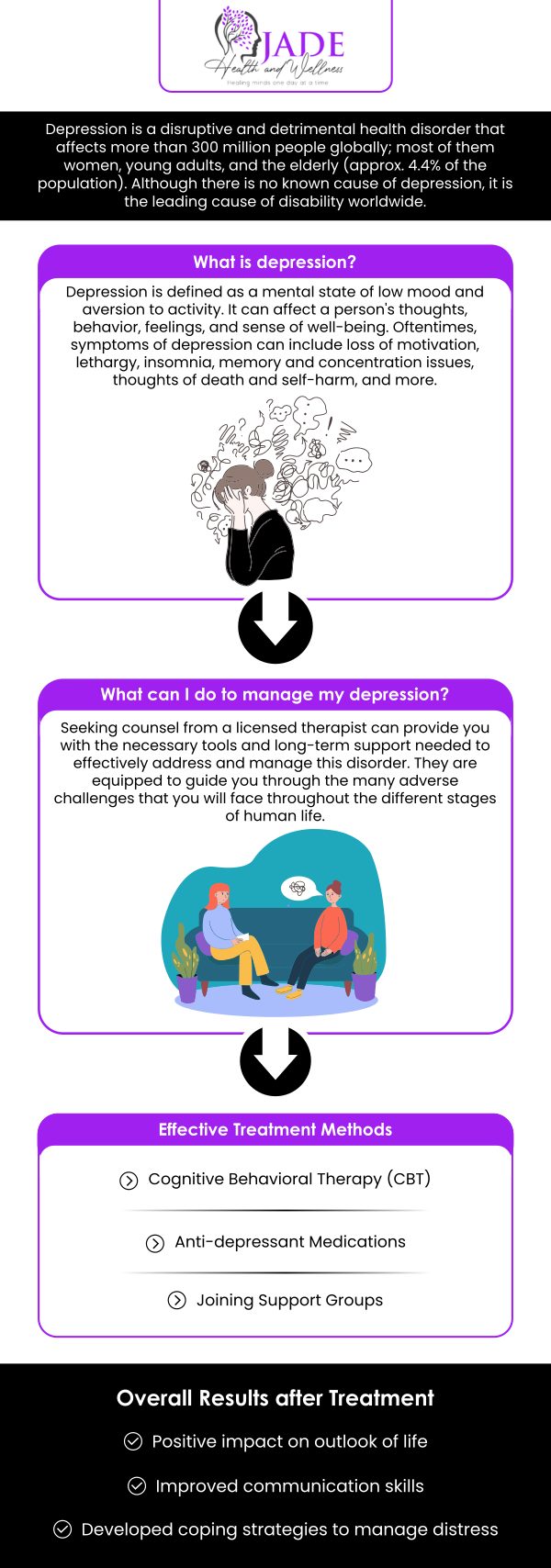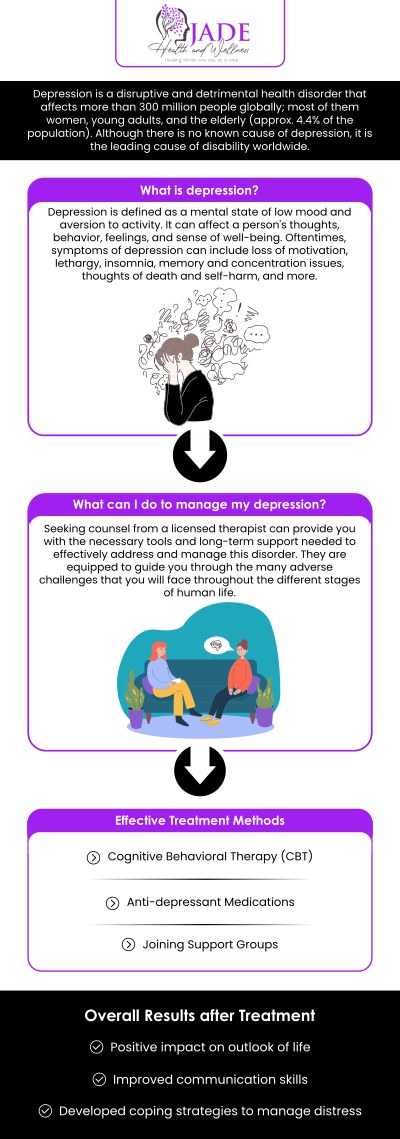Depression Disorders Therapy Specialist in Phoenix, AZ
Depression is a common mental health issue that causes sadness, hopelessness, angry outbursts, loss of interest, and insomnia in people. In the USA, approximately 8.4% of people suffered from depressive episodes in the year 2020. Depression affects your mood, activities that you do in daily life, and your relationship with people. If you are seeking therapy for depression, talk to Dr. Courtney Gaines. She has been working as a psychiatric nurse practitioner and has extensive experience in crisis, outpatient, and inpatient treatment areas. For more information, contact us today or book an appointment online. We are conveniently located at 2375 East Camelback RD Suite 600 Phoenix, AZ 85016.




Table of Contents:
How common is depression?
What are the types of depression?
What causes depression?
What are the symptoms of depression?
We’ve all likely been in the unenviable position of either having lost a loved one, going through a divorce, lost a job, or experienced something else that has left us feeling sad, lonely, or scared. These feelings are normal under the circumstances, and most people will feel low and sad at times, but in the case of those diagnosed with depression, these feelings are much more intense and tend to persist.
According to the National Institute of Mental Health, in 2019, it was estimated that 20% of American adults (51.5 million had been diagnosed with a mental illness. The prevalence was higher among females (24.5%) than males (16.3%), and young adults aged 18-25 years were more likely to have depression (29.4%) than adults aged 26-49 years (25.0%) or aged 50 and above (14.1%). The highest numbers of depression were reported among bi- or multi-racial adults (31.7%), followed by Caucasian adults (22.2%), and the lowest among Asian adults (14.4%).
Major Depressive Disorder is the most common form of depression and is diagnosed when a person has at least five of nine common symptoms (listed below). One of the symptoms must be either an overwhelming feeling of sadness or a loss of interest and pleasure in normal activities. Other types of depression are:
• Persistent depressive disorder (dysthymia) is characterized by a low, dark, or sad mood that persists for most of the day, on most days, and for at least 2 years (children and adolescents may mostly experience irritability that persists for at least 1 year).
• Premenstrual dysphoric disorder (PMDD) is a more severe form of premenstrual syndrome (PMS) and the symptoms can be much more disruptive to social, occupational, and other important areas of life.
• Depressive disorder due to another medical condition. Can be triggered in some people by certain medical conditions, such as:
• Hypothyroidism
• Cushing’s Disease
• HIV/AIDS
• Diabetes
• Stroke
• Parkinson’s Disease
• and more
• Adjustment Disorder with Depressed Mood is diagnosed when depressive symptoms are triggered within 3 months of a stressful event.
• Seasonal affective disorder (SAD) is seen only during a specific time of year, usually winter, and is believed to relate to the shorter days, and lack of sunlight.
Depression can affect anyone, at any age and in every walk of life, and be caused by several factors including:
• Age. Seniors are at a higher risk of depression which can be exacerbated by factors such as living alone, declining health, and limited social support.
• Medication. Depression can be a side-effect of some medications.
• Conflict.
• Death or loss.
• Gender. Women are more likely than men to suffer from depression. Although it’s not certain why, hormones may play a role.
• Genetics. Those with a family history of depression may be at an increased risk of developing the disease.
• Major events. Both good and bad events can lead to stress and depression.
• Serious illness.
• Biochemistry. Imbalances in certain brain chemicals may contribute to depressive symptoms.
• Environmental factors. ongoing exposure to violence, abuse, poverty, or neglect can lead to depression.
Symptoms of depression can vary from mild to moderate to severe and can include:
• Feeling sad or blue
• An increase or decrease in appetite
• Agitation
• Slowing of thoughts and/or movement
• Insomnia or hypersomnia (sleeping too much)
• Fatigue and low energy
• Increase in unnecessary physical activities, such as pacing or being unable to sit still
• Having feelings of guilt or worthlessness
• Finding it difficult to think, concentrate, or make decisions
• Having suicidal thoughts or ideations
For more information, contact us today or book an appointment online. We are conveniently located at 2375 East Camelback RD Suite 600 Phoenix, AZ 85016. We serve patients from Phoenix AZ, Scottsdale AZ, Paradise Valley AZ, Alhambra AZ, Tempe AZ, and surrounding areas.


Additional Services You May Need
▸ ADHD/ADD
▸ Anxiety Disorders
▸ Bipolar Disorders
▸ Borderline Personality Disorder
▸ Depression Disorders
▸ Eating Disorder
▸ Grief Therapy
▸ Life Coaching
▸ Men’s Mental Health
▸ Mental Health Therapy
▸ Mood Disorders
▸ OCD Disorders
▸ PTSD Disorders
▸ Panic Disorders
▸ Stress Disorders
▸ Talk Therapy
▸ Women’s Mental Health
▸ Social Phobia


